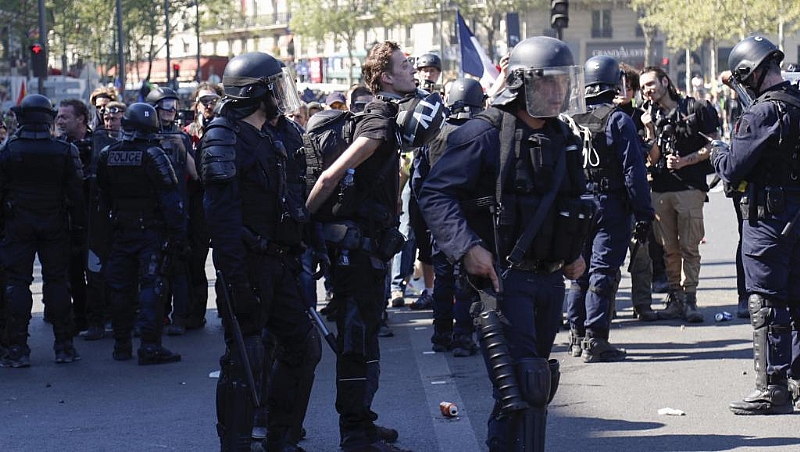
[ad_1]
French press freedom groups have described the arrest of journalist Gaspard Glanz at the Yellow Vest protest in Paris this weekend as "an affront to press freedom".
Glanz, an independent video reporter covering social movements, was arrested while he was covering a protest on the Republic Square in Paris on Saturday.
Placed in custody for "insulting a representative of the public authority" and "participation in a group to provoke acts of violence and degrading", Mr. Glanz remained in custody Monday, in waiting for his referral to court.
Police also arrested independent journalist Alexis Kraland on Saturday, but released him in the evening.
A video of the arrest shows Glanz asking a line of police officers to speak to a superintendent, saying that he was targeted by a tear gas grenade. When an officer repels Glanz, he gives him the finger and a group of officers stops him.
Giving the finger to a police officer is a reason for arrest for insulting a representative of the public authority.
Lawyer Raphael Kempf said that the 48-hour custody period was "disproportionate and illegal" and amounted to "an affront to freedom of the press and freedom to inform".
"If they want to question him for pointing the finger at a security officer, it's not necessary to keep him in custody, he could be summoned to court," he said. Kempf.
Fifty journalists and others rallied in court Monday to protest against Glanz's prolonged detention. The hashtag #FreeGaspardGlanz has been trending on Twitter for most of the day.
A petition calling for Glanz's release and removal of his name from the watch list of presumably dangerous people, carried more than 20,000 signatures Monday night.
Journalism or activism
Glanz and his production company Taranis News are part of a recent trend of video journalists plunged into social movements, filming with light materials, often during clashes between protesters and police.
Glanz considers himself a journalist, while others see themselves as activists or both.
The French daily Libération reports that Glanz played a role in replaying footage revealing the scandal surrounding Alexandre Benalla, the former bodyguard of President Emmanuel Macron.
Saturday's arrest and Monday's court referral were not the first time Glanz had to face court proceedings for incidents related to his reporter activities.
He was sentenced to a symbolic fine for taking the walkie talkie from an officer of the riot police while he was covering the cleaning of the "Jungle" refugee camp in Calais in 2016.
According to his lawyer, he was later sued for publishing a Nazi slogan next to a police photo on Facebook.
Press support
But the arrest of Glanz drew the support of press freedom advocacy groups, who spoke of widespread targeting of journalists covering the yellow vest's demonstrations.
"We are shocked by the widespread repression of many journalists since the beginning of the Yellow Vest movement," said Dominique Pradalié, secretary general of the National Union of Journalists at the courthouse rally, adding that the journalists had filed "dozens complaints "since the movement. started last November.
In a statement, the union said the authorities were trying to "intimidate journalists by preventing them from informing the country's citizens".
The press freedom group Reporters Without Borders also issued a general warning that the police were targeting journalists during demonstrations.
"A number of incidents since the beginning of the Yellow Vest movement, targeting both professional and non-professional journalists clearly identified as being members of the press when they shoot or take pictures, impede the work of the press and limit the capture of images. events that, by their very nature, are of crucial public interest, "said Catherine Monnet, deputy chief editor of the group.
Injury reports
Another union, journalists from the CFDT, called for an investigation into the behavior of the police and indicated that it was considering going to a French rights organization regarding the respect of the code of ethics by the security forces.
Several journalists said they were injured during Saturday's protests.
Two journalists said to have been hit with pomegranate bombs in Toulouse and Paris, a photographer from the AFP agency "was hit by a tear gas grenade at the legs" and "was hit, not at the time of the action ", by police officer, according to the agency.
The French government has said that the police often have trouble getting journalists to do their job.
"Security forces are mobilized every Saturday to prevent violence and ensure the safety of protesters but also journalists who regularly take part, and again this Saturday," said Sunday to AFP a spokesman for the Ministry of the Interior.
"If journalists are arrested, what can happen, they are not arrested as journalists, but because of offenses."
Source link